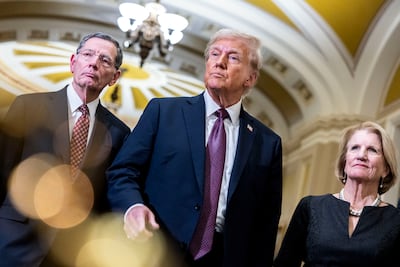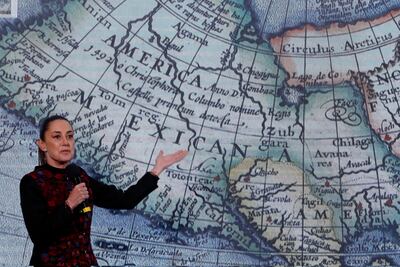In his successful campaign last year for a second term in the White House that will begin on January 20, US president-elect Donald Trump ostentatiously ran as “a man of peace” opposed to foreign adventures and “forever wars”. But if his recent comments are anything to judge by, he is more like a man of pieces. He wants a piece of this country, and a piece of that country, and a piece of yet another one.
It’s hard to exaggerate how extraordinary, norm-violating, provocative and disturbing his recent statements – coming even before he has returned to the Oval Office – have been. They are without precedent in more than 100 years of US policymaking, with Mr Trump suddenly sounding less like a 1930s isolationist and more like an 1890s imperialist.

He has renewed his previous idea of annexing Greenland to the US – an idea roundly rejected by both the inhabitants of Greenland and the Danish state to which they are affiliated. He has offered to buy the territory from Denmark, but he has also more than once suggested that the US might just seize Greenland by force.
Denmark, it might be noted, is not just a US ally in Nato, but a founding member of the security alliance dating back to 1949. But what is a little extortion or annexation among friends? Given Mr Trump’s well-known hostility towards Nato, perhaps Copenhagen should regard all of this as well-earned punishment.
Closer to home, Mr Trump insisted he would rename the Gulf of Mexico the “Gulf of America”, as if Mexico were not in the Americas or, for that matter, in North America. However, Mexican President Claudia Sheinbaum, who appears to relish her demagogic exchanges of threats and insults with Mr Trump, said it might be more appropriate to rename the US, “Mexican America”.

It’s hard to know who sounds more ridiculous in this puerile mudslinging. But it doesn’t bode well for US-Mexican relations in the coming months, despite the fact that the two countries rely on each other for crucial economic, environmental, strategic and other co-operation.
Mr Trump is long on record as having been opposed to the return of the Panama Canal to Panamanian sovereignty in 1999, pursuant to a treaty negotiated in the 1970s by then president Jimmy Carter, who passed away last week. Given his fit of international bellicosity, it’s no surprise, then, that the Panama Canal, too, has come squarely into Mr Trump’s crosshairs.

He has accused China of controlling the Canal, which has no basis in fact. And he accused the Panamanian government of charging US shipping “exorbitant” rates in violation of the handover treaty even though fees are assessed based on vessel type, cargo and other characteristics not associated with the ownership or flagging of the vessels. It is the kind of accusation that makes little sense when subjected to scrutiny, but which will probably play well with Mr Trump’s nativist base.
He declined to rule out the use of force in seizing the Panama Canal as well as Greenland. In a slightly gentler threat, but with a somewhat more ambitious target, he proposed that Washington could use “economic force” to turn Canada into the 51st state in the US. All of these measures he characterised as pressing matters of national security.
The question is, how seriously to take all of this provocation?

Mr Trump’s defenders will undoubtedly claim that he is adopting canny bargaining positions, over-bidding to achieve some sort of beneficial terms in future negotiations. It’s hard to imagine what can be realistically gained from Denmark or Panama, although complex trade talks with Canada and Mexico are always ongoing.
But this theory seems like an indulgent rationalisation. Perhaps four years of frustration have built up a number of aggressive ideas that simply need to be vented before real responsibility is assumed. Again, that’s probably too optimistic.
Mr Trump may actually be preparing to begin trying to throw the disproportionate US military and economic might around the world for economic gain and perhaps even territorial expansion – including at the expense of longstanding allies.
This is probably the worst-case scenario. It would effectively find Washington joining the ranks of some of the other most potent global and regional countries as another revisionist power standing against the global system that was, ironically, constructed largely under US influence since the end of the Second World War. Moreover, it would, as the targets of such threats indicate, increasingly pit the US against historical partners rather than adversaries.
Perhaps worst of all, such a development would surely presage the retreat of the US into a smaller but much more firmly controlled sphere of influence, presumably based mainly in the western hemisphere, but possibly including parts of the North Atlantic and South Pacific. Under such circumstances, the US could be anticipated to readily accede to the development of regional spheres of influence by former adversaries such as Russia, China and even Iran, or others, in their own immediate environs.
Historically, maintaining a balance of power between spheres of influence held by waxing and waning forces on a global scale has a wretched history. It has almost invariably led to periods of massive strife, most notably the two world wars, and even the Napoleonic wars that were effectively a first world war before that term was coined. Any US policy oriented in that direction is overwhelmingly likely to prove calamitous.
Probably the least worrying plausible explanation is that it’s all just political pandering to a chest-thumping, frustrated, flag-waving domestic support base. Among the most worrying is that this is further, although hardly the only, indication that Mr Trump may be ageing badly.
The rapid-fire nature and inexplicable strategic or any other meaningful value of these outbursts could be consistent with any of these interpretations, especially the latter two. If he’s just pandering, there is little to worry about, at least for now. If, however, this is more evidence of a particularly important national leader increasingly drifting away from reality, that’s bad news for the whole world.
Hopefully the self-proclaimed “man of peace” isn’t going to pieces. It’s even more imperative that he isn’t serious about gobbling up huge chunks of the closest US neighbours. That could take a jigsaw to the international landscape.


